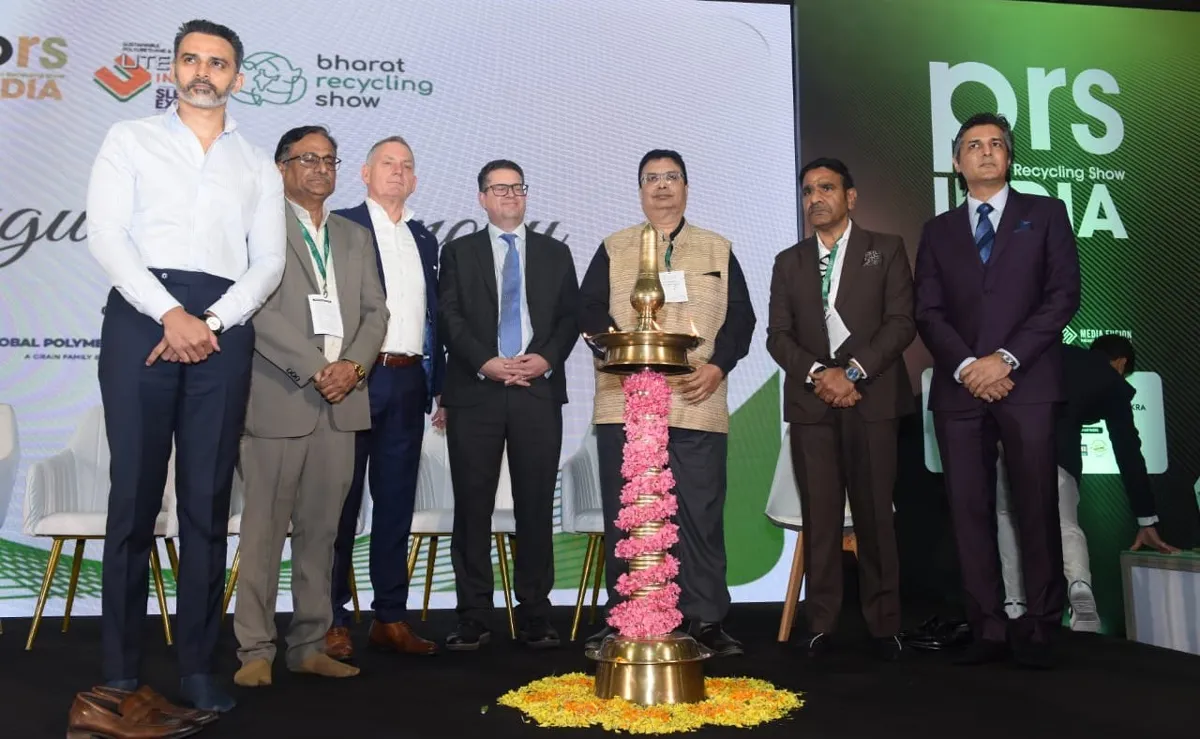Plastics Recycling Show (PRS) India and the first edition of the Bharat Recycling Show (BRS) 2025 have opened at the Bombay Exhibition Centre, Mumbai, marking India’s largest combined platform dedicated to recycling and circular economy solutions. Organised by Media Fusion and Crain Communications, the two events bring together 150 exhibitors, 8,000 visitors and participants from more than 10 countries, showcasing technologies, innovations and best practices across the recycling value chain.
The inaugural ceremony was attended by senior dignitaries including Dr Jairaj Phatak, Director General, All India Institute of Local Self Government; Siddhesh Kadam, Chairman, Maharashtra Pollution Control Board; Sanjay Mehta, President, Material Recycling Association of India; Sandeep Vakharia, Hon Secretary, Bombay Non-Ferrous Metals Association; Sushil Kothari, President, Bombay Metal Exchange; Deepak Rungta, Director, Association PET Recycling (Bharat); Sameer Joshi, Vice Chairman, Indian Plastics Institute; Ankit Jain, Director, Ribotl; Prabhakar Milavarapu, Chief Marketing Officer, Chakra; Pawandeep Singh, Vice President – Business Development & Customer Success, Attero; and Sandeep Singh, CEO, Ishitva Robotics Systems. Their participation underscored the sector’s growing collaboration across public and private stakeholders.
Running across three days, the platform serves as a key hub for recyclers, manufacturers, technology developers, policymakers and investors to discuss emerging trends and policy priorities driving India’s shift toward a circular industrial economy. The need for accelerated investment was also highlighted, with industry leaders noting that India’s e-waste recycling sector alone requires around Rs 50,000 crore to scale and continues to face raw material shortages.
Together, PRS India and BRS 2025 aim to strengthen industry-wide dialogue, foster innovation and support the country’s transition to a sustainable, resource-efficient future.
Sanjay Mehta, President, Material Recycling Association of India, emphasized , “MRAI has been working with the central government for the past 15 years on policy making and advocacy across sectors including e-waste, tyres, plastics, oil, batteries, and metals. While India has made significant progress in recycling areas such as e-waste, tyres, and metals, the plastic industry continues to face major challenges and requires stronger advocacy. Our foremost agenda is to compile accurate and comprehensive data on plastic scrap recycling in India, including the quantities collected, sent to landfills, and effectively recycled. The association aims to ensure that within the next one to one and a half years, this verified data will be made available to the public and the Government of India to help organize and strengthen the plastic recycling sector.”
Siddhesh Kadam, Chairman, Maharashtra Pollution Control Board, said “Maharashtra has been at the forefront of environmental leadership, becoming the first state in India to implement a ban on single use plastics. Recycling represents the future and forms the foundation of a truly circular economy. The visible effects of climate change, from shifting rainfall patterns to shorter monsoons and rising temperatures, highlight the urgency for sustainable action. The Maharashtra Pollution Control Board, in partnership with the state and central governments, is developing incubation hubs to support youth led startups in recycling and resource management. Such initiatives and platforms not only showcase India’s progress in plastic recycling but also encourage innovation, turning waste into a valuable resource and driving a cleaner, more resilient future, turning garbage into the next gold.”
In India’s, every discarded commodity from plastics and paper to metals and e-waste represents both a resource and a responsibility: for example, the plastics sector already processes over 10 million tons of waste annually, the paper fibre loop uses roughly 45 % recycled input, and metals like zinc have recycling rates as low as 10 %, underscoring that our circular-potential stays only partly tapped. These sectors are all witnessing a transformative shift driven by sustainable practices, technological innovation, and progressive policy frameworks.<p></p>
<p>PRSI & BRS has garnered support from leading industry associations, including the India Lead Zinc Development Association (ILZDA), Material Recycling Association of India (MRAI), Bombay Non-ferrous Association of India, Bureau of Middle East Recycling (BMR), and Mumbai Trading & Metals (MTLEXS), Aluminium Extrusion Manufacturers Association of India (ALEMAI), NETRA, BNMA, BMR, International Copper Association of India, Thane Municipal Corporation, Theistic Business Consultants as the Strategic Partner, and We Park as the Startup Partner and many more, reinforcing its significance as a key platform for the recycling sector. The exhibition featured renowned recycling technology providers, including Power Hydrotech, Apex Knives, Fornnax Technology, Hysan Balers, Advance Hydrautech, Safar Ecopet and many more industry leaders, showcasing state-of-the-art recycling technologies and solutions tailored for the Indian market.
Together, BRS and PRS India 2025 reinforce India’s growing leadership in recycling, resource recovery, and circular economy solutions—creating a powerful platform for innovation, collaboration, and responsible growth.





















